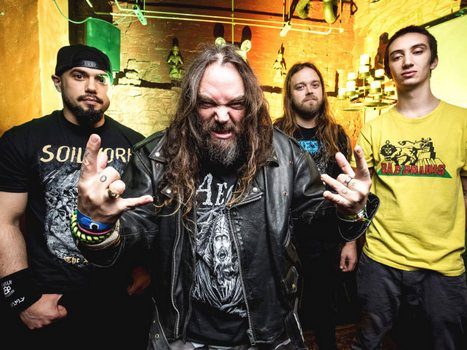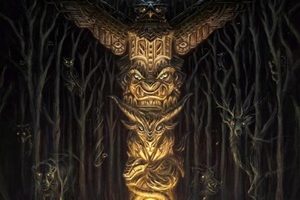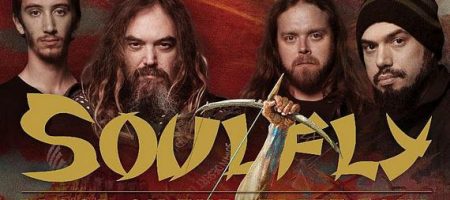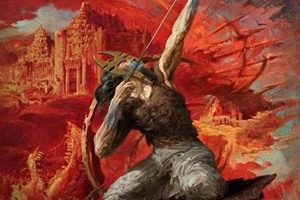Soulfly – Max Cavalera on Nailbomb’s Point Blank
Monday, 23rd October 2017
Taking a trip back in time to 1993, Max Cavalera partnered up with Fudge Tunnel’s Alex Newport to create Nailbomb, and they released their only studio album, Point Blank, the following year. A fusion of industrial pounding and metallic thrash, they released a live album in 1995 (Proud to Commit Commercial Suicide) and the project was abandoned. But there was something special about the Point Blank album. From the controversial cover, to the intense and memorable samples, to the aggression that seethed through each riff, it’s an album that many who heard it ‘back in the day’ still have fond memories of. And due to its pointed lyrical content, it still remains relevant to this day.
Now, in 2017 Max has enlisted his band Soulfly to bring the album out once more for a tour that sees it being played in its entirety. While Alex Newport will not be a part of it, long-time fans are no doubt elated to hear that the songs will be given the live treatment (Proud to Commit Commercial Suicide was the band’s only live performance). What’s more, is that the songs have been upgraded to fit into a full-band format (Nailbomb originally consisting only of Cavalera and Newport). We seized the opportunity to talk to Cavalera himself just prior to the start of the tour to chat about Point Blank’s resonance, the time of industrial metal, sampling in songs, and how looking back to the past can help shape the future.
Dead Rhetoric: It’s a treat to get to talk to you about the Nailbomb project. When I was a teenager, I was growing up with that album. It’s cool to see you out promoting and playing it once again.
Max Cavalera: It’s going to be a blast. We are really excited. I think it’s going to be a lot of fun. We’ve been rehearsing a lot and it sounds great. So far we have done about two weeks of rehearsals, and it’s coming along great – we are ready. I like the package too – Cannabis Corpse, Noisem, Lody Kong. Kind of an underground package. It was more of an underground record [Point Blank]. It’s not like Roots; that was a bigger record. Nailbomb is more underground. I think it’s cool that we are doing it this way. It’ll be better for the fans.
Dead Rhetoric: Yeah, you are pulling from those more old school, underground fans to begin with so it’s a nice package.
Cavalera: I think the record sounds amazing live. It was made to be played live. I know it was a project, but if there was one record that was ready to go on tour, it was that. It’s on fire – it’s so good. All the songs have great energy. The fact that we are turning them into a band version, because it’s Soulfly playing them, that adds to it in intensity and the organic feel to it. I think the electronic sounds you hear on Point Black, they are turning into band songs. They are so much cooler, I can’t even explain. It’s so cool, so awesome, so heavy. I’m super fired up – I’m ready.
Dead Rhetoric: Had you been hearing a lot of people who requested more Nailbomb songs through the years? I know you’ve played a few songs as Soulfly in the past.
Cavalera: We’ve heard people asking for the album since it came out. Asking, “Are you guys going to do another record?” Alex [Newport] is a very unique individual. His ideas are a bit strange. He never liked the rock life. It was not made for him. I love playing live; I love the noise of the crowd. He told me once that he hated the noise of the crowd. I was like, “Wait, hold on…say that again?” He said that he hated the noise of the crowd, and that he couldn’t stand it when you get on stage and people are screaming. I said, “Whoa man, that’s one of the wildest things I’ve ever heard anybody say! You are a musician. It’s part of your job.” It’s like being a soccer player and hating the ball [laughs]. It’s crazy.
So we just did the two records – and people freaking love it. It became a cult band. So many people have covered it. I went on Bandcamp and was checking out all the people that have done covers of Nailbomb. There were some good ones – a bunch of different ones. So I think it’s perfect timing. Having the band play, Soulfly hasn’t done much this year. I’ve been so focused on Roots – taking Roots everywhere…Australia, Europe, America. It’s good for Soulfly, because we are going to make a new Soulfly record next year. This way we can keep it going and get it rolling.
Dead Rhetoric: What drew you to that industrial side of things with the Nailbomb project?
Cavalera: I was really interested in the industrial metal side of things that were going on at the time…Godflesh, Front Line Assembly, Treponem Pal from France, Skinny Puppy, Young Gods…Alex and I were listening to all of that. Alex liked a lot of Steve Albini stuff, a lot of noise stuff. I was always into the whole death metal and thrash metal stuff. My friendship with Alex kind of started by asking how he played riffs from Hate Songs in E Minor [Fudge Tunnel], because I loved that record. The riffs are huge. So he would show me those, and ask me how I did a riff like “Arise” with the thrash picking. So I would show him that. It’s funny, because if you listen to Fudge Tunnel’s album that was done right after Nailbomb, The Complicated Futility of Ignorance, Alex put all the thrash riffs on it. It’s cool – it was cool to hear Fudge Tunnel sound like that. So I think I had a cool kind of influence on him. But he also influenced me on my songwriting. I love the stuff we did with Nailbomb album. All the Fudge Tunnel riffs on that album – “Cockroaches,” Sick Life” – that’s some of the coolest stuff I’ve ever done.
Dead Rhetoric: Industrial and metal seemed to be more intertwined in the early/mid-90s. Then things kind of drifted apart. Any thoughts on why that might have happened?
Cavalera: That’s just how it is, man. It’s how things go. I mean, people still carry on putting out good stuff. I think Al Jourgensen said he has a new Lard album coming out sometime. I’m very excited to hear that. I like his Surgical Meth Machine thing he did, that was cool. Ministry has always been doing good stuff. I love the era of Rio Grande Blood, when Tommy Victor played for them, I think they wrote a lot of cool shit. Fear Factory is great – Dino [Cazares] was on “24 Hour Bullshit,” that’s his riff. It was cool to get Dino involved with Nailbomb. Fear Factory is another really cool band that came out of that. I think it just switches and other things came out of it. Like Rammstein. I don’t even know – maybe even White Zombie was even influenced, with their sound. Powerman 5000, all that stuff. But it all just kind of shifted. But at that time, I listened to the old Ministry records, Godflesh, Skinny Puppy, Treponem Pal, it was great. It was really inspiring. It inspired us to do that [record].
That was before you had to clear all the samples. Nowadays, it’s a pain in the ass. If you have to have a sample on your album, you have to go clear it with this and pay for that…all this bullshit. Back then, you just grabbed what you wanted and put it on your record; you didn’t give a fuck. That’s how on Nailbomb we had samples from Salvador, A Clockwork Orange, Apocalypse Now, Henry: Portrait of a Serial Killer, we had it all and you didn’t have to clear shit. It was cool. It was when making an album was still fun and freeform. Today, it’s a bit more bureaucratic.
Dead Rhetoric: That’s right. I kind of forgot about that aspect entirely. It goes along with how we were talking about how things changed with industrial metal. Perhaps that had something to do with the fact that things veered away.
Cavalera: Yeah, I always loved the Ministry samples. I think they had something from Full Metal Jacket and Apocalypse Now. On “New World Order,” there’s a little bit of Apocalypse Now that I loved. That little guitar, when they have the guys in the boat patrolling Vietnam. They listen to the radio and the guitar lick comes in. It was genius to put that on a song. So I always paid attention to that stuff. Samples in metal was a cool connection. Doing samples – it’s fun and it’s cool.
We had a blast on Nailbomb. Nothing was off-limits; nothing was too crazy. We did so much crazy shit. We had an old washing machine someone didn’t want any more, so we beat the shit out of it. We recorded the sounds of us banging on that thing. I had a Camaro that went real fast so we got it out on the road and got it up to 80 mph and hit the brakes. We recorded the brakes and brought the speed down and put it on the record. I had a big vinyl collection – Dead Kennedys, Discharge, Black Flag. The beginning of “Wasting Away” is actually Lemmy’s bass together with Sonic Youth mixed with Discharge or something. But you can’t tell. We made it so it’s impossible for you to tell. The one you can recognize is “Guerillas,” because it has a Celtic Frost “Procreation of the Wicked” riff in it. It was fun grabbing shit like that and putting it on the album. It was one of the most fun records I ever made.
Dead Rhetoric: What do you feel resonated with the Point Blank album with fans? Like you said, it’s a very revered album, at least in the metal underground.
Cavalera: It’s a big fuck you to everybody and everything – who doesn’t love that? Who doesn’t love the pure rebellion and pure protest of it? It’s a protest album without us even knowing that we made a protest album. We were just flipping the finger at everything we didn’t like – society, organized religion, whatever it was that pissed us off, we put it into song. We did stuff in Portuguese – “Vai Toma no Cú” means ‘go fuck yourself’ in Portuguese. We just did it all. “24 Hour Bullshit” is a little bit about guns, and the obsession with guns. “Guerillas” is about war. “Sick Life” was about drugs, even though I never did heroin or anything like that, I wanted to write a song about what I had seen it do to other people. It was a really angry and inspired record. We used to call it ‘1000% Hate’ – that was the original name of the album. We even have some pictures of us that we took with the spray paint on the walls saying 1000% Hate. But then we thought that Point Blank was a much better name.
Then there’s the cover, of course. Who can forget that cover? When it came out, it shocked the shit out of everybody. It was one of the most controversial covers – my friend Danny [Marianino], the guy who punched Danzig, he had that poster on his wall. I gave him a poster of it. His dad was a big mafia type guy – he said his dad came home one day and came into his room and told him to take that poster down right then. He said, “I don’t care about the devil things or the other stuff, but you crossed the line with that one.” When he told me that, I was so proud. I was like, “Dude, that’s so fucking awesome!” That was exactly the type of reaction we wanted. His dad got pissed off about the poster – that’s it. That’s what the cover is about. It’s reaction. It’s pure shock value in its greatest form. I found out – in the back of the photo, when we got the original photo, that the lady survived. She was not killed. She’s about to get shot, but she never got shot. It was just an interrogation. But it looks pretty bad. Things were going really bad for her at that moment.
It was a great cover. It reminded me of the first Rage Against the Machine album, with the monks on fire. Or Sepultura’s Refuse/Resist single cover, with the guy in front of the tank. Those really powerful images that people capture. That was one of them. I really love that cover. On the back, there’s a black guy being beaten up by the cops. So it’s right on point with what’s going on right now. The backdrop that we used, we still have it. It’s a KKK guy with a target on his face, so it’s perfect for right now. Everything about that record is so relevant today. It’s amazing – I think it’s more relevant now than it was 20 years ago. The songs make more sense now, and they apply more to this world right now than when we made the record, which is crazy!
Pages: 1 2




























